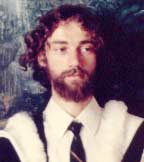
Me on degree day. Was my beard ever that colour?! |
I realised this week that I've been working 30 years. Can you
imagine it? I hardly seem to have got my act together since leaving
the Royal College of Art in July 1975.
I was the first student - the only student, to start
with - in the natural history illustration department,
set up by John Norris Wood in 1972, and, during
my three years, I worked, on and off, on this large painting of
birds in the college greenhouse (below), which formed the
centrepiece of my degree show.
Once John was asking a couple of students if they'd
seen me about. They looked blank; 'He's the one who looks like Rasputin,'
said John. They realised who he meant immediately (I'd better explain
that I wore the fur-lined hooded cloak only on degree day). |
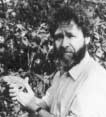
John Norris Wood in his natural habitat, the greenhouse, 1974 |
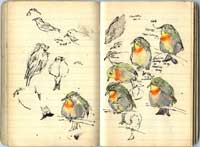
Student sketchbook:
Pekin Robin, London Zoo
|
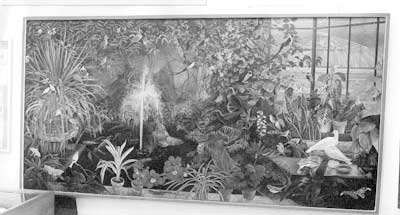
Greenhouse Mural, 8ft x 4ft acrylic on chipboard, collection of
the Royal College of Art
|
Work in Progress
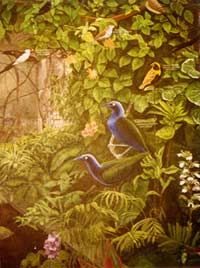 The
painting absorbed so much work. I'd ask John what he thought of
my progress since the previous week and he'd look around the painting,
trying to spot the area I'd been working on; I'd plug away at
it a leaf, or a bird, at a time. Each life-sized bird is labelled
with its common and Latin name. The
painting absorbed so much work. I'd ask John what he thought of
my progress since the previous week and he'd look around the painting,
trying to spot the area I'd been working on; I'd plug away at
it a leaf, or a bird, at a time. Each life-sized bird is labelled
with its common and Latin name.
There's a Tolkien story which I kept thinking of as I worked called
Leaf by Niggle, about a painter who could paint a leaf
better than he could paint a tree. I tried to give each leaf individual
attention and aimed to give the whole scene a theatrical Victorian
effect.
The greenhouse was on the top floor of the Kensington Gore building
so the roof of the Royal Albert Hall appears in the background (right).
Art historian Conal Shields thought the Java doves
were the most pre-Raphaelite corner of my painting. He described
the mural was an entire painting course in itself. I fought battles
over each section of it and learnt so much in the process.
After the first year, one of John's former tutors Edward
Bawden (1903 - 1989), took a look at the painting
and declared that it was finished already but it went on and on,
absorbing seemingly limitless amounts of work. Even when I'd got
it screwed to the wall in my degree show I found that I wanted to
add one last detail: a frog.
Liz Butterworth, who had been in the school of
fine art, the year above me, said that the geranium (below,
left) was the best bit of painting in the mural. It was the
first thing I'd done, three years earlier. |
|
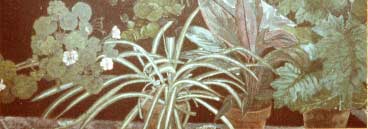 |
Coming down to Earth
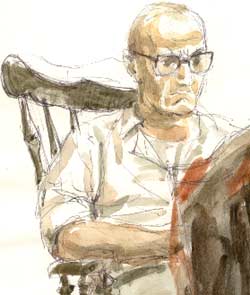
My long-suffering dad, Douglas
|
My mum and dad came to the degree ceremony; I'd won prizes and
been approached about various commissions and book projects and
there were bits of teaching in the offing but my dad wasn't terribly
impressed:
'I don't know how you're going to make a living,' he said when
we got back to Yorkshire, ' and I don't know if you know
how you're going to make a living, but I'm bloody well
not going to support you - on Monday you'll get down to the Labour
Exchange in Wakefield and sign on.'
When I think back to my degree day I still remember that feeling
of inadequacy, and it's difficult to shake it off, even today. Unless
you're an industrial designer with sponsorship or a golden boy like
the young David Hockney, who graduated a decade before me, it's
unlikely that you will have worked out how to make a living by the
time you leave college: you've been so immersed in your work that
it's hardly occurred to you. I might have had great ideas but they
were all still in the pipeline.
It was a wrench to leave the enthusiasm and the 'change the world'
idealism of South Kensington behind me and return to the crushing
constraints of hometown life. Without a phone - without e-mail in
those days - my college friends seemed a long way away, part of
a bright interval in my life.
I feel that if my dad was still with us and he could see how I'm
doing now, 30 years after leaving college, he'd still want me to
go out and get a proper job! |
My friend Gina in California e-mailed me
today; she says she read this quote and thought of me (and of herself):
'If you want to identify me ask me not where I live,
or what I like to eat, or how I comb my hair, but ask me what I am living
for, in detail, and ask me what I think is keeping me from living fully
for the things I want to live for. Between those two answers you can
determine the identity of any person.'
Thomas Merton, from The Man in the
Sycamore Tree 
Richard Bell, richard@willowisland.co.uk |